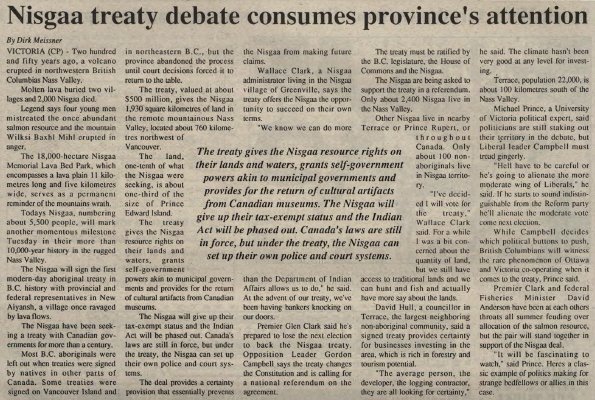"Nisgaa treaty debate consumes province's attention"
- Publication
- Tekawennake News (Ohsweken, Ontario), 5 Aug 1998
- Full Text
- Nisgaa treaty debate consumes province's attentionBy Dirk Meissner
VICTORIA (CP) - Two hundred and fifty years ago, a volcano erupted in northwestern British Columbia's Nass Valley.
Molten lava buried two villages and 2,000 Nisgaa died.
Legend says four young men mistreated the once abundant salmon resource and the mountain Wilksi Baxhl Mihl erupted in anger.
The 18,000-hectare Nisgaa Memorial Lava Bed Park, which encompasses a lava plain 11 kilometres long and five kilometres wide, serves as a permanent reminder of the mountains wrath.
Todays Nisgaa, numbering about 5,500 people, will mark another momentous milestone Tuesday in their more than 10,000-year history in the rugged Nass Valley.
The Nisgaa will sign the first modern-day aboriginal treaty in B.C. history with provincial and federal representatives in New Aiyansh, a village once ravaged by lava flows.
The Nisgaa have been seeking a treaty with Canadian governments for more than a century.
Most B.C. aboriginals were left out when treaties were signed by natives in other parts of Canada. Some treaties were signed on Vancouver Island and in northeastern B.C., but the province abandoned the process until court decisions forced it to return to the table.
The treaty, valued at about $500 million, gives the Nisgaa 1,930 square kilometres of land in the remote mountainous Nass Valley, located about 760 kilometres northwest of Vancouver.
The land, one-tenth of what the Nisgaa were seeking, is about one-third of the size of Prince Edward Island.
The treaty gives the Nisgaa resource rights on their lands and waters, grants self-government powers akin to municipal governments and provides for the return of cultural artifacts from Canadian museums.
The Nisgaa will give up their tax-exempt status and the Indian Act will be phased out. Canada's laws are still in force, but under the treaty, the Nisgaa can set up their own police and court systems.
The deal provides a certainty provision that essentially prevents the Nisgaa from making future claims.
Wallace Clark, a Nisgaa administrator living in the Nisgaa village of Greenville, says the treaty offers the Nisgaa the opportunity to succeed on their own terms.
"We know we can do more than the Department of Indian Affairs allows us to do," he said. At the advent of our treaty, we've been having bankers knocking on our doors.
Premier Glen Clark said he's prepared to lose the next election to back the Nisgaa treaty. Opposition leader Gordon Campbell says the treaty changes the Constitution and is calling for a national referendum on the agreement.
The treaty must be ratified by the B.C. legislature, the House of Commons and the Nisgaa.
The Nisgaa are being asked to support the treaty in a referendum. Only about 2,400 Nisgaa live in the Nass Valley.
Other Nisgaa live in nearby Terrace or Prince Rupert, or throughout Canada. Only about 100 non-aboriginals live in Nisgaa territory.
"I've decided I will vote for the treaty," Wallace Clark said. For a while I was a bit concerned about the quantity of land, but we still have access to traditional lands and we can hunt and fish and actually have more say about the lands.
David Hull, a councillor in Terrace, the largest neighbouring non-aboriginal community, said a signed treaty provides certainty for business investing in the area, which is rich in forestry and tourism potantial.
"The average person, the developer, the logging contractor, they are all looking for certainty," he said. The climate hasn't been very good at any level for investing.
Terrace, population 22,000, is about 100 kilometres south of the Nass Valley.
Michael Prince, a University of Victoria political expert, said politicians are still staking out their territory in the debate, but Liberal leader Campbell must tread gingerly.
"He'll have to be careful or he's going to alienate the more moderate wing of Liberals," he said. If he starts to sound indistinguishable from the Reform party he'll alienate the moderate vote come next election.
While Campbell decides which political buttons to push, British Columbians will witness the rare phenomenon of Ottawa and Victoria co-operating when it comes to the treaty, Prince said.
Premier Clark and Federal Fisheries Minister David Anderson have been at each others throats all summer feuding over allocation of the salmon resource, but the pair will stand together in support of the Nisgaa deal.
"It will be fascinating to watch," said Prince. Here's a classic example of politics making for strange bedfellows or allies in this case.
- Creator
- Meissner, Dirk, Author
- Media Type
- Text
- Newspaper
- Item Type
- Clippings
- Publisher
- Tekawennake News
- Place of Publication
- Six Nations of the Grand River, ON
- Date of Publication
- 5 Aug 1998
- Subject(s)
- Personal Name(s)
- Clark, Wallace ; Clark, Glen ; Campbell, Gordon ; Hull, David ; Prince, Michael ; Anderson, David.
- Corporate Name(s)
- Government of British Columbia ; Department of Indian Affairs ; House of Commons ; University of Victoria.
- Local identifier
- SNPL005023v00d
- Language of Item
- English
- Geographic Coverage
-
-
British Columbia, Canada
Latitude: 48.43294 Longitude: -123.3693
-
- Creative Commons licence
 [more details]
[more details]- Copyright Statement
- Public domain: Copyright has expired according to Canadian law. No restrictions on use.
- Copyright Date
- 1998
- Copyright Holder
- Tekawennake News
- Contact
- Six Nations Public LibraryEmail:info@snpl.ca
Website:
Agency street/mail address:1679 Chiefswood Rd
PO Box 149
Ohsweken, ON N0A 1M0
519-445-2954



